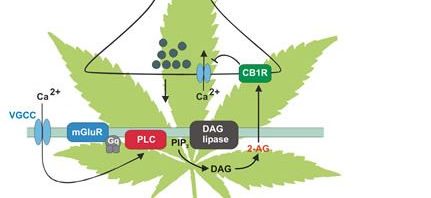The stigma and restrictions surrounding the medicinal uses of endocannabinoids need to be lifted. Regardless of the conversation about legalizing endocannabinoid products for recreational use, the medical answers these chemicals may hold make the need for research into their chemistry absolutely imperative.
In our recent research into the role of endocannabinoids, we—as a class—have found them to be an elusive chemical in our body. They have many functions, activate many different biological pathways, and have two main receptors found in numerous locations in the body.
The key biological roles of endocannabinoids in need of research include: ageing, neuroinflammation, energy homeostasis, neurogenesis, autophagy, and neurodegredation.
Ageing
Endocannabinoids normally found in our body chemistry are known to decrease in concentration as we age. The same decrease is observed in the concentration of endocannabinoid receptors in the body.
image from: http://www.nature.com/nrc/journal/v3/n10/box/nrc1188_BX1.html
This results in an overall decrease in endocannabinoid signaling as we age—meaning the biological roles they play in our body are signaled to occur less frequently.
The age at which this decrease begins is not known, and at what level it becomes symptomatic is also unknown. The factors that predispose some individuals to have more symptoms than others from this decline in signaling have also yet to be identified.
Answers to these questions can only be solved with more research into the endocannabinoids themselves.
Neuroinflammation
As the body receives signals of stress, endocannabinoids are used to moderate the body’s response. Stress in the body leads to inflammation, which in turn increases stress. This cyclic stress is thought to be regulated by a pathway which releases endocannabinoids to signal an anti-inflammatory response.
This anti-inflammatory response was observed in a recent study in which endocannabinoids were used to target intestinal inflammation. In each of the three endocannabinoids tested, all reduced the inflammation.
This encouraging research, again, emphasizes that increased research into endocannabinoids is medically relevant and beneficial.
Energy Homeostasis
Hunger and appetite regulation occur in the hypothalamus of the brain. Leptin and endocannabinoids play the regulating roles—leptin decreasing hunger, and endocannabinoids increasing appetite.
With the increasing prevalence of obesity in the United States, this regulatory system has become of increasing interest.
This is also a target for those suffering from the side-effects of chemotherapy—in which increasing one’s appetite is preferable.
This energy homeostasis role that endocannabinoids play is still in its infancy of research, but holds promising answers to tap into the obesity problem, as well as the ability to control one’s appetite and decrease unwanted side effects of other drugs. The possibilities are endless, but more research is needed.
Neurogenesis
Endocannabinoids, in some studies, have shown an increase in memory. An increase in activity at both CB1 and CB2 receptors has shown an increase in neurogenesis in the hippocampus—the hub of long term memory.
This puzzled our class, as excessive use of recreational endocannabinoids is known to decrease memory—however this proves yet another area of research to be conducted.
If certain doses of endocannabinoids could be found to increase memory—this could be a gateway to a successful treatment for dementia, Alzheimer’s, and other memory impairments; however, without research this possibility remains unattainable.
Autophagy
Autophagy is a normal process in the human body in which cells clean out and degrade old, dysfunctional proteins, allowing for new, functional ones to take their place. It is an important part of keeping a cell functioning properly.
image from: http://roguehealthandfitness.com/how-to-increase-autophagy-for-lifespan-extension/
As we age, our bodies’ lose their ability to conduct autophagy. It is a natural process, and is likely due, in part, to the reduction in endocannabinoid signaling as we age.
This specific mechanism is still not well understood, as in our research endocannabinoids were shown to both activate and inhibit autophagy. However, there has been very promising evidence in a recent study suggests that inducing autophagy via endocannabinoids could lead to a cancer treatment.
Regardless—this unclear answer as to the direct role of endocannabinoids in the autophagy signaling pathway, again, begs for more research to be done on these chemicals.
Neurodegeneration
Here lie the disadvantages to endocannabinoid use and signaling in the body. It is known—though not well understood—that the inflammatory pathway that endocannabinoids help to regulate also activates the oxidation of an enzyme call COX2. This enzyme is involved with the inflammatory pathway breaks down endocannabinoids into prostaglandins.
These prostaglandins result in many different biological responses and could result in more inflammation—causing harm to humans. Thus, too much activation through endocannabinoids could have very harmful effects.
The concentration of endocannabinoids needed to observe these detrimental effects is also unknown.
In order for the benefits endocannabinoids display to be utilized, more research into their potential toxic effects most also be conducted. These chemicals—while they display many positive results—do have negative effects that without research will not be fully comprehended.
Overall, endocannabinoids show great biological relevance and medical promise. Our research has proven to us that there is still much to be explored and understood. Increased education and research needs to be undertaken in the chemical realm of endocannabinoids–deeming them the new frontier for exploration.
